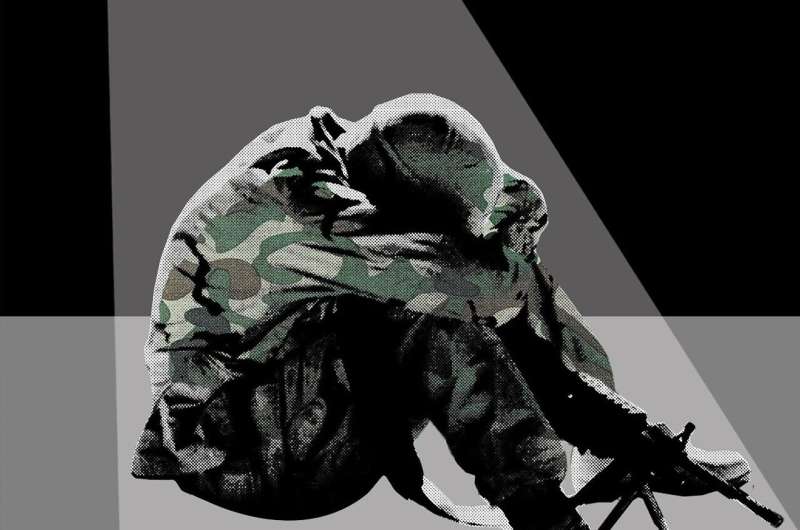This article has been reviewed according to Science X's editorial process and policies. Editors have highlighted the following attributes while ensuring the content's credibility:
fact-checked
reputable news agency
proofread
Q&A: How to support someone with post-traumatic stress disorder

Question: I'm reaching out because I'm in a tough spot. A close friend rode out Hurricane Ian in Florida last year and it seems to me that he's struggling now. He's angry and jumpy, while being numb to what's happening around him. He told me that he's not sleeping well, especially when another hurricane is in the news. Is it possible that he has PTSD from the hurricane? I'm not sure how to offer support without making him feel uncomfortable.
Answer: Post-traumatic stress disorder, also called PTSD, doesn't just happen to characters on the screen. It's a normal, natural response to trauma and happens when the nervous system, which is designed to protect you from danger, gets stuck in the fight-or-flight response.
People may develop PTSD when they experience, see or learn about a shocking experience or event involving harm, threatened death or serious injury. Natural disasters, like experiencing the power and devastation of Hurricane Ian, can trigger PTSD.
In addition to natural disasters, other common events that cause PTSD symptoms include accidents, being threatened with a weapon, combat exposure, abuse or receiving a life-threatening medical diagnosis.
PTSD symptoms
Some people experience distressing symptoms for a short period after a traumatic event but get better with time and self-care. For others, the symptoms worsen over time and begin to interfere with daily activities and relationships.
Overall, PTSD symptoms usually are grouped into four categories:
- Intrusive thoughts: Recurrent and unwanted memories of the traumatic event can cause significant emotional distress or physical reactions. The person may experience nightmares or flashbacks, which is reliving the traumatic event again.
- Avoidance: People with PTSD may avoid talking about the event or steer clear of places, activities or people that remind them of the event.
- Mood and thought disturbances: This category of PTSD symptoms can mirror depression, with people experiencing hopelessness, negative thoughts about themselves or others, detachment from loved ones, lack of interest in activities, emotional numbness and relationship difficulties.
- Reactivity: These symptoms may include being easily startled, always on guard for danger and overwhelming feelings of guilt or shame. The person may be irritable or have angry outbursts. They could have trouble sleeping or concentrating and engage in self-destructive behaviors such as drinking too much or taking illicit drugs.
It's important to note that some people may have a few PTSD symptoms but not enough for an official diagnosis of the condition. In these cases, treatment still can be helpful and can guide people toward self-care strategies and coping mechanisms.
PTSD treatment
The good news for you and your friend is that PTSD is treatable, and many people manage it well or recover from their symptoms. Some protective factors are especially helpful during recovery, including having positive social support from friends like you.
PTSD treatment involves addressing both the physical and mental aspects of the condition. Treatment plans developed by a health care professional are tailored to meet the needs of each person.
Certain treatments calm the nervous system and help people regain control over their physical responses to triggers. These tactics help the person have an automatic physical response to tell their body that a perceived threat isn't accurate. Examples include grounding techniques, breath awareness and body-focused interventions. For example, short and shallow breaths can be signs of the nervous system reacting to a trigger. Through treatment, people can identify this reaction and learn to take slow breaths, which can calm the physical reactions.
Cognitive processing therapy can help your friend identify and challenge negative thoughts and beliefs related to the hurricane. Other treatments, such as exposure therapy and eye movement desensitization and reprocessing can help as well. Finally, medications may be helpful when used in combination with other treatment options.
Positive support
I encourage you to discuss your concerns with your friend. Focus on your observations of his behaviors before and after the hurricane. Listen without judgment and don't minimize his feelings. Suggest that he seek professional help to undergo a thorough exam and have his symptoms evaluated.
Finally, I recommend that you learn more about PTSD to get a grasp of what he is going through and why he may react the way he does. Remember that each person's reaction to a traumatic event is valid, and his trauma shouldn't be compared to another's as "better" or "worse."
PTSD isn't a sign of weakness. It's a normal response to traumatic events, like a hurricane in your community. With a combination of interventions and professional help, your friend can learn to manage his symptoms and regain control.
2023 Mayo Clinic News Network. Distributed by Tribune Content Agency, LLC.





















